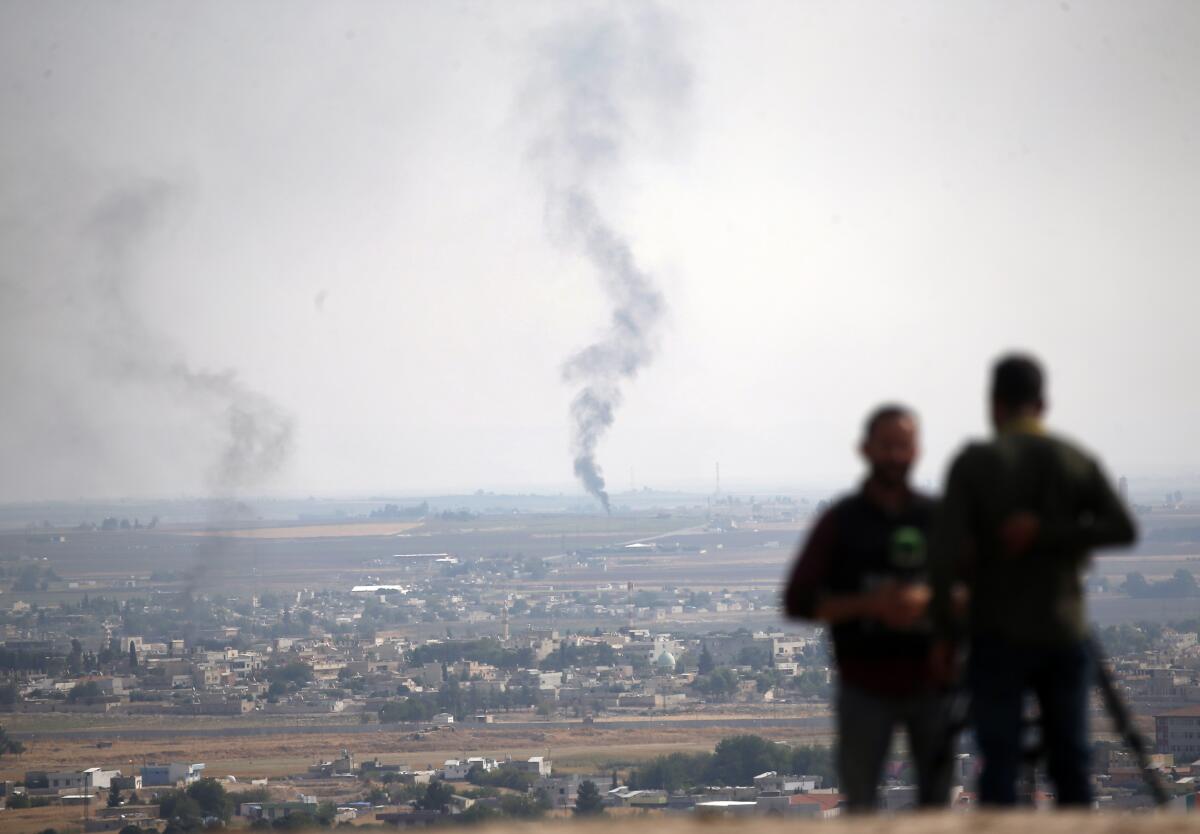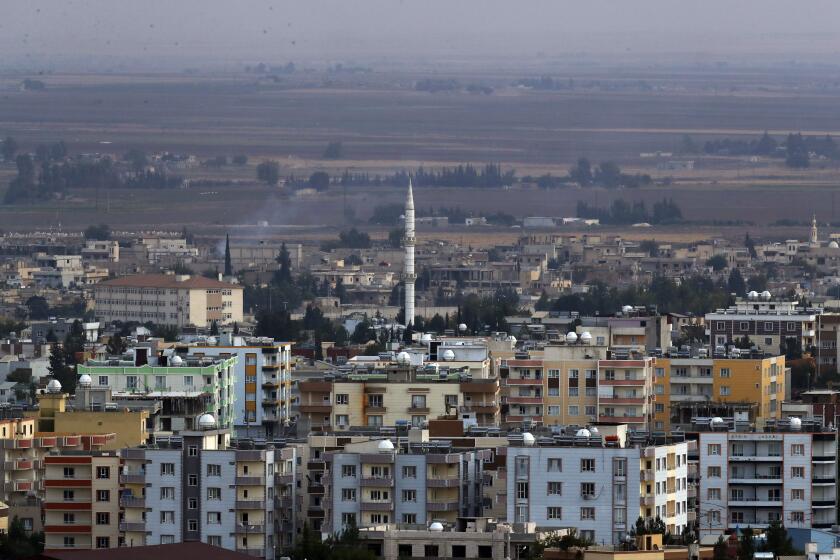‘How long can we live like this?’: Kurds in growing refugee camp plead for help, end to losses, suffering

- Share via
DAHUK, Iraq — As Turkish artillery battered her neighborhood, Haifa Ahmad gathered up her kids and fled last week from Qamishli, a mostly Kurdish city on Syria’s northern border with Turkey.
Now, she and her four children — along with her sister and her two young ones — are residents of white canvas tent No. B278 in a fast-growing, United Nations-run camp on the scorched high plains of Iraqi Kurdistan.
“Can you help us move to another country?” Ahmad asked a group of Western visitors to the sprawling camp, 65 miles northwest of Irbil, the capital of Iraqi Kurdistan. “How long can we live like this?”
In two weeks, the conflict in northeastern Syria — where President Trump ordered the withdrawal of U.S. forces as Turkish forces advanced into Syrian territory — has displaced more than 200,000 people, according to various official estimates.
Most have fled south into areas of Syria controlled by Kurdish-led forces or under the authority of Syria’s central government in Damascus.
But thousands of Syrian Kurds have been escaping into the territory of the Kurdistan regional government of northern Iraq since Turkey began its offensive this month.
On Sunday, Syrian Kurdish forces said they had withdrawn from the besieged Syrian border town of Ras al-Ayn — with a predominantly Kurdish population — as part of a U.S.-brokered cease-fire. Meanwhile, U.S. troops were reported to be continuing their pullback from northern Syria and were headed for Iraq.
The fragile, five-day cease-fire announced Thursday by U.S. Vice President Mike Pence appeared to be holding, though both Turkish and Kurdish forces have alleged violations. Turkey has vowed to resume its advance and creation of a border security zone if Kurdish Syrian forces do not withdraw from positions near the Turkish border, an area that includes large concentrations of Kurds.
On Saturday, Turkish President Recep Tayyip Erdogan vowed to “continue to crush the terrorists’ heads” if the Kurdish forces do not leave.
Ankara views the Kurdish forces as terrorists. But Syrian Kurds also consider Turkey’s proxy Arab forces in northern Syria terrorists with links to Al Qaeda and other extremist groups. The Kurds accuse Ankara of pursuing the ethnic cleansing of Kurds in northern Syria, an allegation denied by Turkey.
The Syrian Kurds arriving here represent the latest refugee wave in a zone that has been a destination for successive flows of people fleeing regional conflicts.
In 2014, this region received many of the 500,000 Iraqis — including members of the Yazidi sect, Christians, Shiite Muslims and others — who fled the onslaught of the Islamic State Sunni militants. Many remain stranded in the vicinity of Dahuk, home to almost two dozen camps for displaced Iraqis and Syrian refugees.
Whether the latest twist in the catastrophic Syrian conflict will morph into yet another massive refugee crisis remains to be seen.
Syrian Kurds now fleeing to Iraqi Kurdistan are being directed to this newly reactivated camp, known as Bardarash.
As of late Sunday, the camp held more than 3,000 Syrian Kurds — but many more were expected to arrive in coming days, especially if fighting resumes in northern Syria.
Under an agreement between the U.S. and Turkey, a five-day cease-fire is en effect to allow Kurdish fighters to pull back from border areas.
Each day, hundreds of Syrian Kurds are pouring into the camp, arriving in minibuses from the Syrian frontier.
Residents describe a chaotic dash from Syria involving payments to smugglers who help transport escapees on foot and in vehicles to the Iraqi border. Smugglers — who charge as much as $700 per person, refugees said — were needed because officials of the Kurdish-led administration in Syria’s northeast have been blocking people from leaving, apparently fearing a mass exodus of their key population base.
“When you’re hearing shelling and bombardment, the only thing one can think of is protecting your children and getting out,” said Yusuf Abad, 26, who said he escaped with his wife and 1-year-old daughter from Ras al-Ayn.
The Syrian Kurds arriving here all speak of a visceral fear of the Turkish military proxies — mostly Syrian rebels, many formerly affiliated with hard-line Sunni Islamist groups. Syrian Kurdish fighters, a secular force previously backed by Washington, played a key role in defeating Islamic State and other militant Syrian rebel factions in northern Syria. But now many Syrian Kurds say they are on the run from the Turkish-backed militants.
“We heard the shouts of Allahu Akbar!”— God is great, the familiar battle cry of many Sunni extremist fighters — “and we knew we had to get out of there as soon as possible,” recalled Abad, who said he had worked in a job-training program for young people in Ras al-Ayn.
Some refugees also were wary of the advance of Syrian army troops. Syrian Kurdish forces, having lost their U.S. benefactors, invited President Bashar Assad’s troops back to the region, from which Syrian government forces had largely withdrawn in 2012.
Some young Syrian Kurdish men said they feared being drafted by Assad’s forces, or worried that they might be wanted by Damascus. But the level of fear about the return of Syrian government forces was nothing compared with the dread inspired by the invasion of the Turks and their proxy fighters, whom Ankara has rebranded as the Syrian National Army.
“We know the regime, we lived with them before,” said Haifa Ahmad, the mother of four living in the refugee camp. “But the Turks — they are something completely different. We couldn’t stay with them coming.”
Among those arriving here Sunday was Mohammed Ali, 70, a Kurdish father of nine and family patriarch from Ras al-Ayn, where he said he had lived his entire life. He stood outside his assigned tent, next to the one occupied by his wife, two daughters and several grandchildren who also fled Ras al-Ayn.
“This was a clear betrayal by the Americans,” said Ali, smoking a cigarette as tumbleweeds whipped up by the wind rolled by. “The Turks never would have done what they did had the Americans stayed.”
Ali said he hoped to return home to Ras al-Ayn one day but expressed doubt that it would ever come to pass. “It’s a bitter thing to have to live in a tent,” he said.
Down a dirt path, as newly arrived refugees drove stakes into the ground to hold tents and placed bedrolls inside, Arij Hashin seemed likewise reconciled to a bitter reality: She may never return to her home outside the northeastern Syrian town of Malikiyah. Early in the Syrian conflict, she said, she and her family had to flee to Iraq because of Syrian government shelling. Now they were on the run anew, this time escaping from Turkish forces and their allies.
“As long as the war continues, I’ll never go back now,” said Hashin, 25, who was accompanied by her husband, her sister and two nephews. “Maybe, this time, we will go to another country.”
Special correspondent Hisham Arafat in Dahuk contributed to this report.
More to Read
Sign up for Essential California
The most important California stories and recommendations in your inbox every morning.
You may occasionally receive promotional content from the Los Angeles Times.











